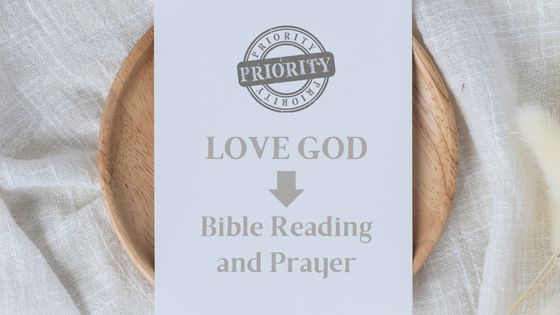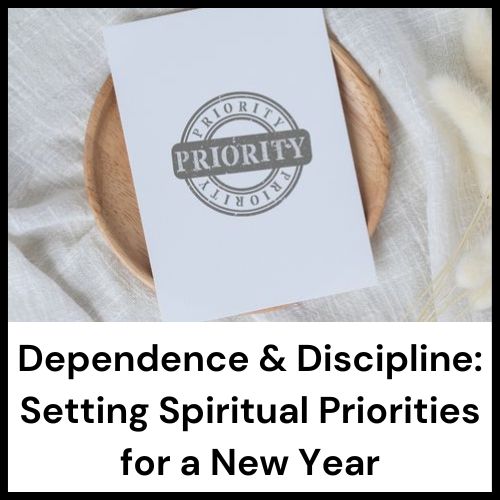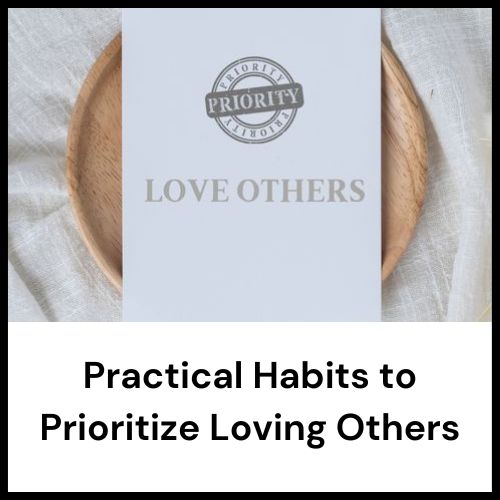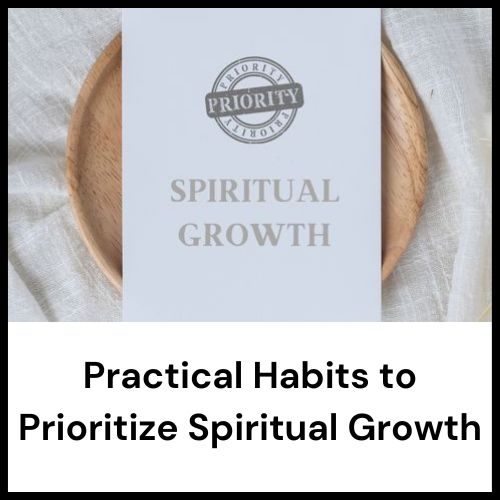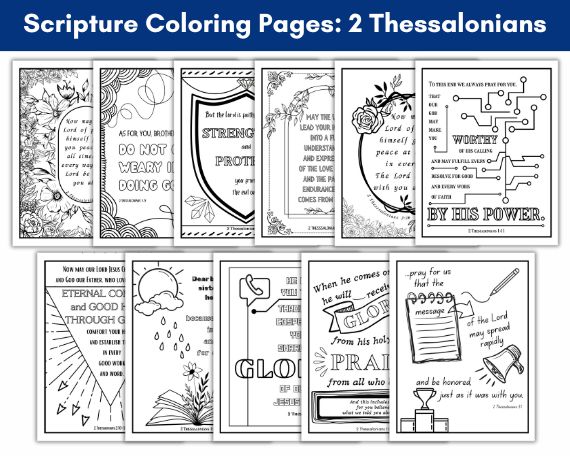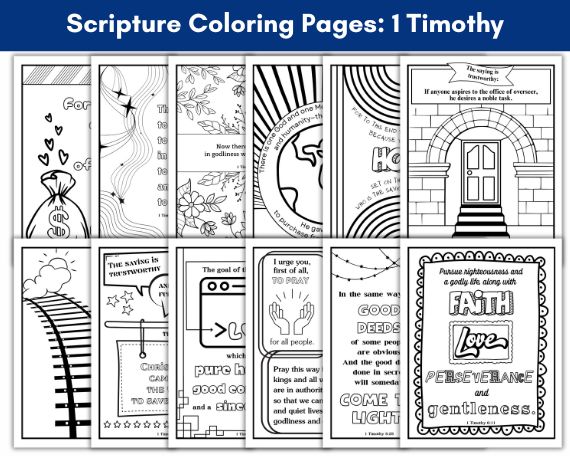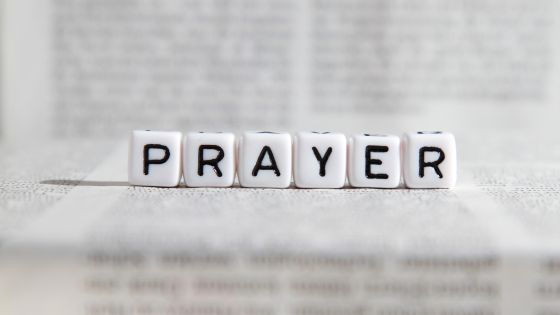Suggestions for Discipline in Reading God’s Word and Prayer
As Christians, our desire is to know and love God. But how? Author Jen Wilkin has said, “The heart cannot love what the mind does not know.” There are two obvious ways for us to know God: read his word (listen) and pray (talk). Even when we agree with the importance of reading God’s word and spending time in prayer, in an age of constant distraction, it is unlikely that we will consistently do those things without making them an intentional priority.
I want to share some practical ideas for how you can implement a habit of Bible reading and prayer. As you look toward a new year, a new season, or even a new week, consider what specific steps you can take to deepen your love for God through spending time listening to His word and communicating with Him through prayer.
(Disclosure: As an Amazon Associate I earn from qualifying purchases. This means that if you click a link and make a purchase, I may receive a small commission at no additional cost to you. I only recommend products I use and love or would love to use! For full disclosure details, click here.)

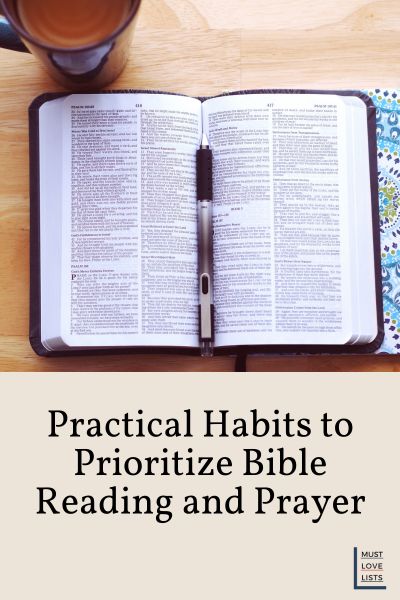
Dependence and Discipline in Spiritual Habits
This article is the second in a series of articles intended to help you think deeply about spiritual priorities. For an introduction to what God tells us he wants us to prioritize, read “Dependence and Discipline: Setting Spiritual Priorities for a New Year.”
Other Articles in This Series
The first priority we see in scripture comes from what Jesus called the “greatest commandment.”
Love the Lord your God with all your heart and with all your soul and with all your mind.
Matthew 22:37
We’re going to focus in on knowing and loving God more deeply through the intake of His word and the expression of our hearts through prayer.
Spiritual Reality Check
In our fast-paced, always-on world, it is harder than ever to quiet and focus our thoughts. The frantic pace of our lives diminishes our ability to sit quietly and read a section of scripture, think deeply about it, and respond to what we’ve read in prayer back to the God who so eagerly desires our devotion.
Things that grow our love for God
Here’s a question to answer honestly. You don’t have to tell me or anyone else right now, but be honest with yourself.
How much time in your regular 24 hour days do you spend engaged in any of the following activities:
- reading the Bible
- listening to the Bible audibly
- prayer
- memorizing scripture
- listening to or singing hymns or worship music
- listening to Biblical teaching or instruction (sermons, podcasts)
- spending time in gratitude for who God is—thinking about His character
- considering what God has done in your life, in the lives of others around you, in history and offering praise in response
- noticing the intricacy and beauty of our created world, our bodies and minds and offering thanksgiving and worship to God in response
Things that entertain us
Now, how much time in your regular 24 hour days do you spend engaged in any of these activities:
- Instagram reels
- Facebook groups
- YouTube videos
- TV and movie watching
- games on your phone
- shopping (especially for things you don’t really need)
- self-care
- watching or reading news
- listening to podcasts
- personal hobbies
Before you get too defensive, I want to state that it is not wrong to enjoy any of those things. But for most of us, the stark reality of such a time audit would reveal that the time we spend on things that grow our love for God is miniscule in comparison to the time we spend on things that temporarily entertain us.
It takes about 70 hours to read the Bible cover to cover. The average American watches television for more than 70 hours in one month.
Donald Whitney in Spiritual Disciplines for the Christian Life (published 1991)
Make It a Spiritual Priority to Read the Bible
Consider what has happened in our society between 1991 and now. Most of us are at least peripherally aware of the number of hours we are frittering away on screens.
If it takes only 70 hours to read the entire Bible, that averages out to less than 15 minutes per day to finish the Bible in one year. Can we really not spare 15 minutes a day to hear from the God we claim to love with all our heart?
I will meditate on your precepts and fix my eyes on your ways. I will delight in your statutes; I will not forget your word. Open my eyes, that I may behold wondrous things out of your law.
Psalm 119:15-16, 18
What’s Keeping You from Reading Your Bible
Are you reading God’s word regularly? If not, why not?
- I mean to do it in the morning but get caught up in taking care of kids
- I have good intentions but I get distracted by other things
- It’s boring
- I don’t understand it
- I start out strong every year, but fizzle out pretty quickly
- Some days I remember to read the Bible, but most days I don’t
- I just don’t see how I can add another thing to my crazy schedule
Or if you are reading God’s word, but not enjoying it, do any of these apply to you?
- I don’t see how it applies to my real life
- I mostly do it because I think I should (guilt is my motivator)
- I read my Bible because I want others to think of me as a “good Christian”
Do you struggle more with dependence on God—treating your Bible reading as a task to check off your list—or discipline—doing it only when you feel like it?
Ways You Can Prioritize Reading the Bible
After reading through the list of potential problems getting in the way of regular time in God’s word, you probably have an idea of what is preventing you from making Bible reading a regular habit. Before you move on, pray about this issue. Ask God to help you come up with creative ideas to change this area of your life.
Think about whether any of the following ideas are appealing to you:
- follow a reading plan with one other person
- follow a specific reading plan with a group of people (online or offline)
- join a Bible study group
- check off a printed Bible reading plan
- follow a reading plan in an app on your phone
- get scripture emailed to you daily
- join a group text thread to share one Bible verse each day
- read the Bible chronologically
- read the Bible in a year (chronologically, Genesis to Revelation, Old Testament/New Testament portions daily)
- read the Bible in two years (approximately 6 minutes per day)
- read the Bible in six months (approximately 30 minutes per day)
- follow a reading plan 5 days/week with catch up time built in on the weekends
- follow a reading plan 5-6 days/week and set aside 1-2 days per week for in-depth Bible study
- follow a read-through-the Bible plan but with no end date (allow for deeper study and rabbit trails as you wish)
- follow a theme through the Bible
- study a specific topic in the Bible
- read the Bible in an easy-to-read translation
- memorize scripture (download an app, make your own flash cards, Dwell Differently tattoos, etc.)
How to Overcome Obstacles to Bible Reading
The first step to overcoming obstacles is to avoid them in the first place. This is where I want to mention that especially as women, we live seasonal lives. You will have periods of time with more capacity for deep Bible study than others. As you think about how to prioritize time in God’s word, consider your season and stage of life. Don’t use your busy season as an excuse to let your Bible collect dust on a shelf, but give yourself grace for your very real circumstances.
Here are some practical suggestions that might be helpful in maintaining a consistent habit of daily scripture reading:
- set your Bible out the night before, wherever you intend to read or where you will see it (kitchen table, counter, desk, chair, end table)
- leave your Bible open to where you left off reading (especially helpful if you get interrupted often by kids)
- write out scriptures (post-it notes, notebook or journal)
- save scripture images on your phone
- set an alarm to read your Bible (doesn’t have to be first thing in the morning)
- set reminders on your phone
- don’t pick up your phone until after you’ve read your Bible
- allow yourself flexibility in timing, but give yourself a deadline (e.g. by 2pm, before the kids get off the bus, before dinner)
- turn your phone on Do Not Disturb before you start reading your Bible
- use a memorable phrase as a reminder: Bible before breakfast, Word before Wordle, scripture before screens
- listen to the Bible in the shower
- listen to the Bible while you get ready in the morning
- trade out a time you normally listen to a podcast or watch TV for reading or listening to the Bible
- find someone else who wants to get up early and agree to send a daily accountability text
- read your Bible while you eat breakfast or lunch
- keep scripture cards in your purse or car to read and memorize anytime you’re waiting
- ask someone to check in with you once a month to see how you’re doing on your reading plan or what you’ve been learning from God’s word
- ask someone to pray specifically for you to be consistent and disciplined in your Bible reading
- have a backup plan for when you don’t follow your plan (will you skip readings, double up readings, listen to the passage later in the day, build in catch up days)
Make a Practical Plan to Read the Bible
Now it’s time to get practical. Write your plan down. Here’s an example of how you can make a specific plan.
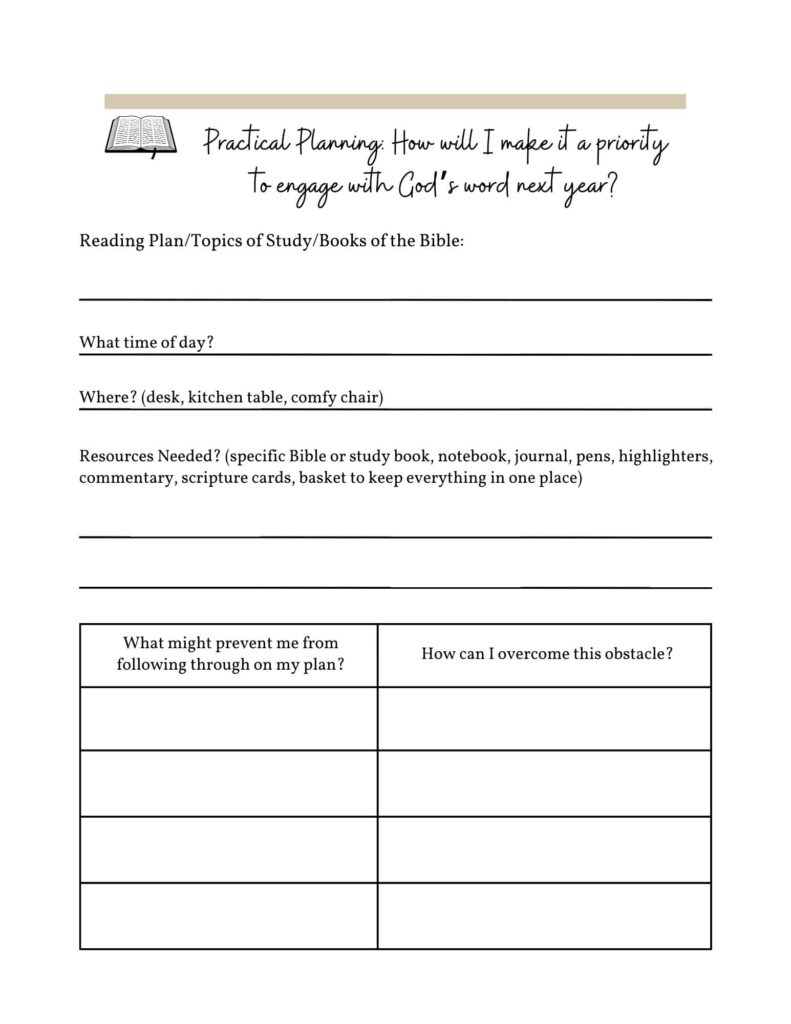
Get specific about what you will read, when you will read, where you will read, and how you will overcome potential obstacles to sticking with your plan.
In addition to a Bible reading plan, you may wish to choose one or two other ways to prioritize intake of God’s word. This might be scripture memorization, buying a calendar with a daily Bible verse, or listening to sermons or scripture every Monday while you’re driving.
Don’t set yourself up for failure by trying to do too many things at once. Choose one small thing to incorporate and focus on making it a regular habit. The more you immerse yourself in God’s word with the desire to know and love Him, the more you will desire to spend time in His word.
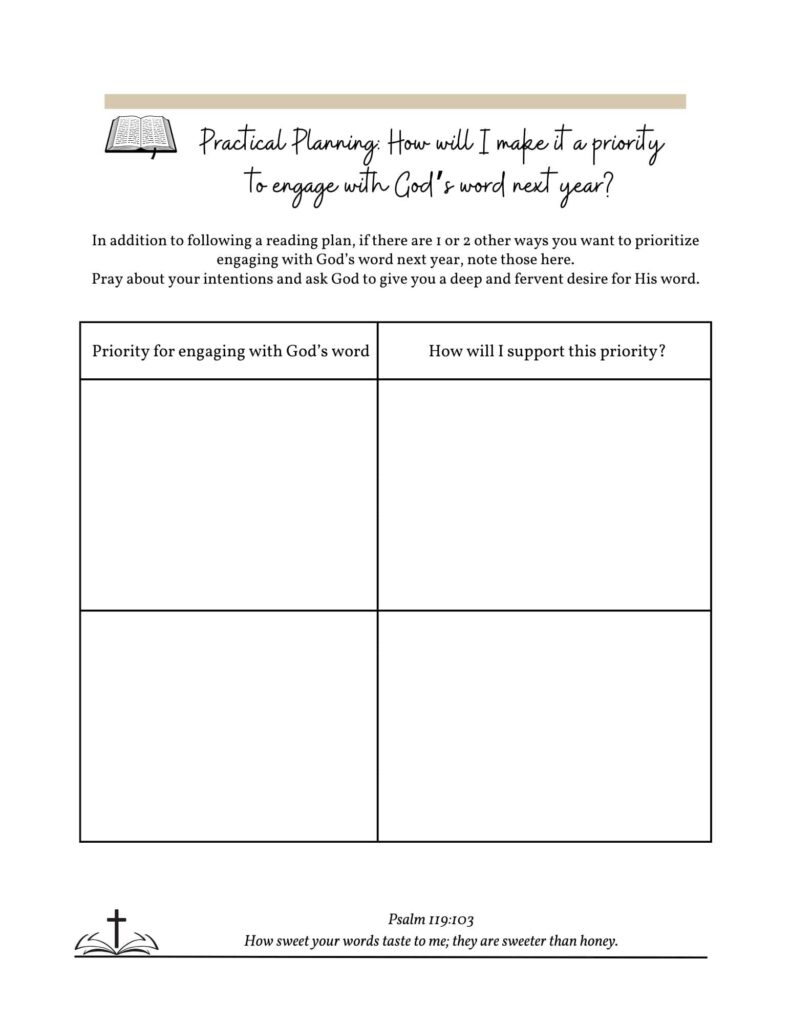
Get specific with how you plan to support your priority. Whether you want to use a scripture memorization app or make yourself flash cards, give some thought to exactly what you will do, along with when and how you will make it happen.

Make It a Spiritual Priority to Pray
Most Christians would agree that we should pray, but the statistics generally reveal that we do not pray all that much beyond desperation prayers when we are in crisis.
Colossians 4:2 instructs us to “devote yourselves to prayer.” Then in 1 Thessalonians 5:17, we are told to “pray continually.”
We can think of devoting yourself to prayer as an exercise of disciplined activity, while praying continually is evidence of a dependent relationship with God.
As to why we don’t pray, Donald Whitney makes this observation. “Prayer is never planned, time is never allotted just for praying. While lip service is given to the priority of prayer, in reality it always seems to get crowded out by things more urgent.”
What’s Keeping You from Prayer
Are you praying regularly? Do you have a habit of prayer? If not, why not?
- I forget to pray
- I get distracted when I try to pray
- There’s too much to do and not enough time to pray
- I don’t really know how to pray
- I don’t see the point in prayer if God is in control of everything that happens
Or if you do make time to pray, do these apply to you?
- I do pray, but it is more a chore than a delight
- I pray only when I’m experiencing a crisis
- I pray through a list of prayer requests from others, but I don’t feel close to God
Do you struggle more with dependence on God—prayer feels like a task or chore—or discipline—praying only when you feel like it or are in a crisis?
Ways You Can Prioritize Prayer
After reading through the list of potential problems getting in the way of spending time in prayer, you probably have an idea of what is preventing you from making prayer a regular habit. Before you move on, pray about this issue. Ask God to show you more of who He is and give you the desire to communicate with Him through prayer.
Think about whether any of the following ideas are convicting or you feel the Holy Spirit calling you to prioritize:
- intentional daily prayer time
- more continuous prayer throughout your day
- keep a prayer journal
- pray with your spouse
- pray with your children
- find a prayer partner
- find a prayer group
- attend church prayer meetings
- pray specifically for missions or the persecuted church
- pray for countries around the world
- pray for your church or specific ministries within it
- pray for a specific person or people daily
- pray for a specific group of people (foster children, public school teachers, police officers, someone you read about in a news story)
- pray for someone you encounter regularly but don’t know (store clerk, gas station attendant, delivery driver)
- when someone shares about a difficult circumstance, ask if you can pray for them
- keep a written list of prayer requests
- pray before my daily Bible reading
- pray scripture (directly pray the words of scripture or personalize them)
- pray in response to scripture (what does God bring to mind—person or situation, worship and praise, confession and repentance)
- do a Bible study on prayer
- create a weekly prayer schedule (pray for specific things or people on certain days of the week)
- pray for your political and government leaders
- give thanks daily
How to Overcome Obstacles to Consistent Prayer
It is almost certain that you will encounter obstacles to your plan. Think about how to overcome distractions, how to overcome your forgetfulness, how to fit prayer time into your busy weekdays, or even what to pray about.
There is no way for me to offer suggestions for every single obstacle you may face, but here is a list of practical suggestions to consider.
If you struggle to remember to pray:
- set alarms or reminders to pray
- block out appointment time on your calendar for prayer
- pray before you get out of bed in the morning
- pray before you reach for your phone in the morning (put a physical sign that says “PRAY” in front of your phone)
- remember to pray for specific requests or people using a specific cue (while waiting for coffee to brew, while standing in line, while brushing your teeth)
- pray immediately (pray with someone right away when they share a prayer request)
- associate prayer with something you already do daily (showering, brushing teeth, eating lunch—it will take a little time, but plaster post-it reminders and digital reminders all over and start small with a short prayer—with time your habit will grow)
If you struggle with distractedness or knowing what to pray:
- pray out loud (can be very helpful in managing distractedness)
- pray while walking (movement can help with focus)
- pray through a missionary prayer handbook
- pray through a church directory
- pray about the thoughts or concerns that are distracting you
- begin to intentionally notice the beauty of nature and praise God for it
- write down prayers (your own and prayers from scripture)
- pray as you read scripture
- use others’ prayers to articulate and inspire your own (the book, Valley of Vision, is a good resource)
- start a gratitude journal and praise God for the blessings you notice
- use the Lord’s Prayer as a guide
- use ACTS as a guide (adoration, confession, thanksgiving, supplication)
If you struggle to make time to pray:
- pray in the car
- pray in the shower
- pray while doing chores (instead of listening to a podcast or music while folding laundry or weeding—pray)
- keep a note on your phone labeled “prayer” and record prayer requests so you can pray whenever you pick up your phone (create a habit of opening your “prayer” note before social media)
- keep prayer cards on your fridge and pray for those people at breakfast
- keep a list of prayer requests for your family to pray for together at mealtime or before bed (use a bulletin board, whiteboard, notebook, or your phone)
- ask for accountability from another Christian woman (text each other reminders to pray or check in regularly)
Make a Practical Plan to Pray
Now it’s time to get practical. Write your plan down. Here’s an example of how you can make a specific plan.
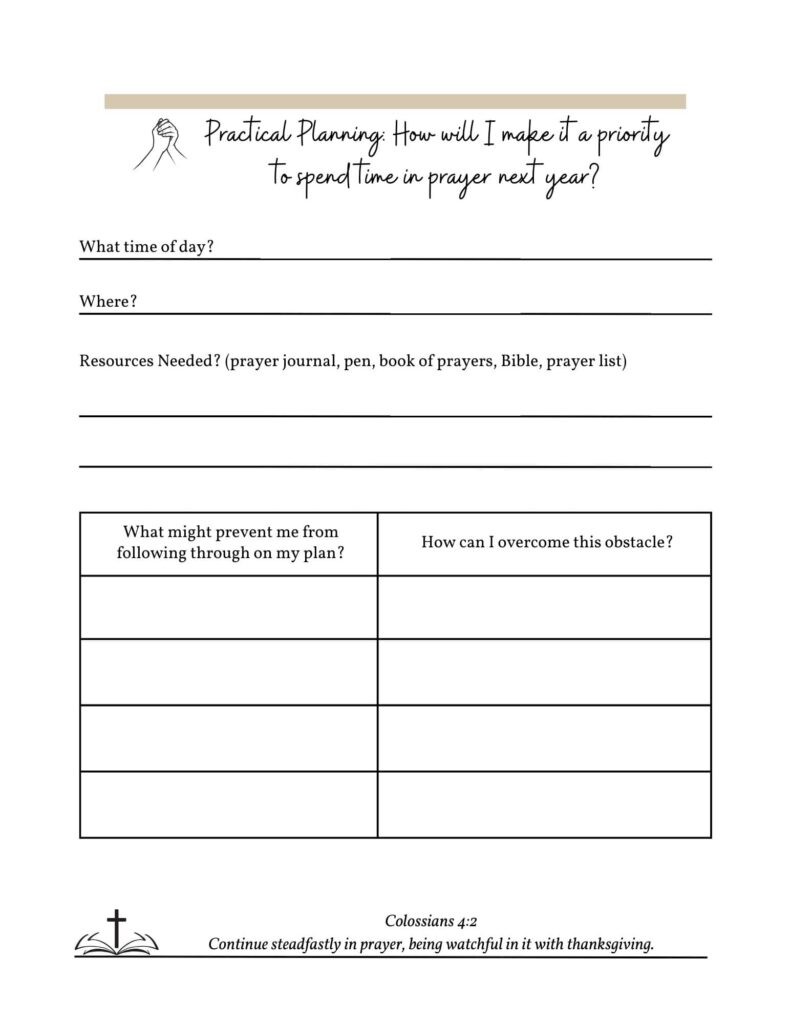
Get specific about when you will prayer, where you will prayer, and how you will overcome potential obstacles to sticking with your plan.
In addition to a dedicated prayer time, you may wish to choose one or two other ways to prioritize prayer. This might be praying more frequently throughout the day, praying for a specific group or purpose, or doing a deeper study on prayer.
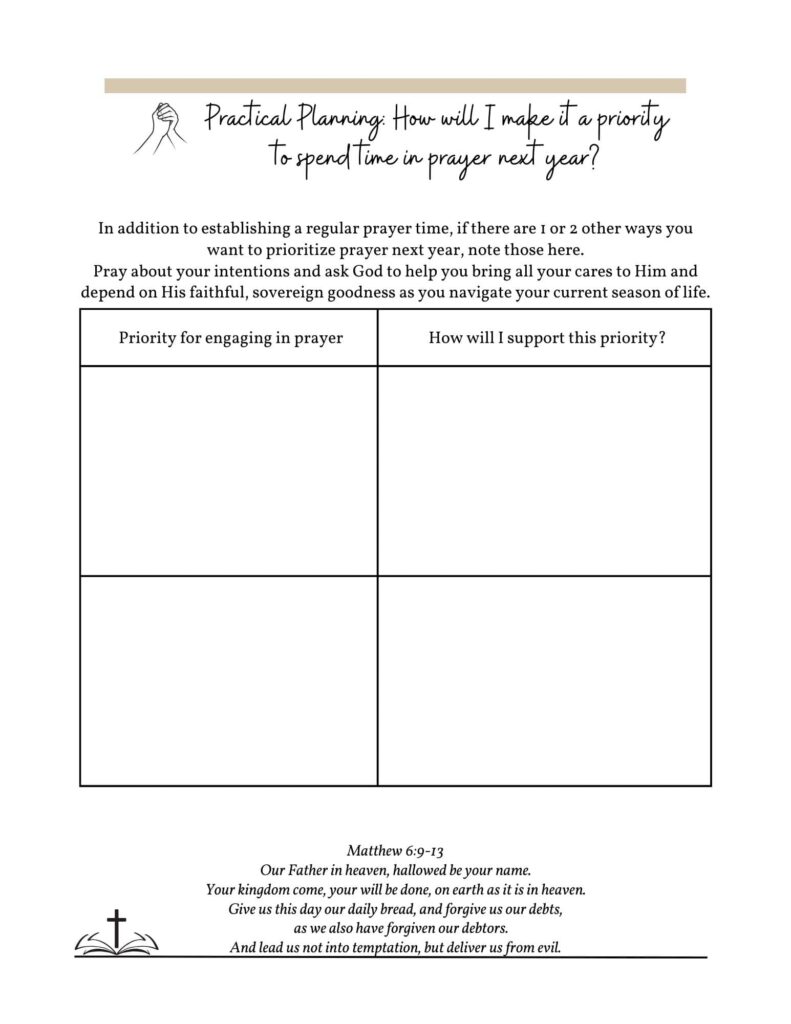
Read: 30 Days of Praying Scripture
Use my guided workbook to walk through setting spiritual priorities in all three areas—loving God, loving others, and spiritual growth. You’ll find prompts, questions, and practical suggestions to help you determine and implement habits and disciplines that respond to God in faithful obedience.

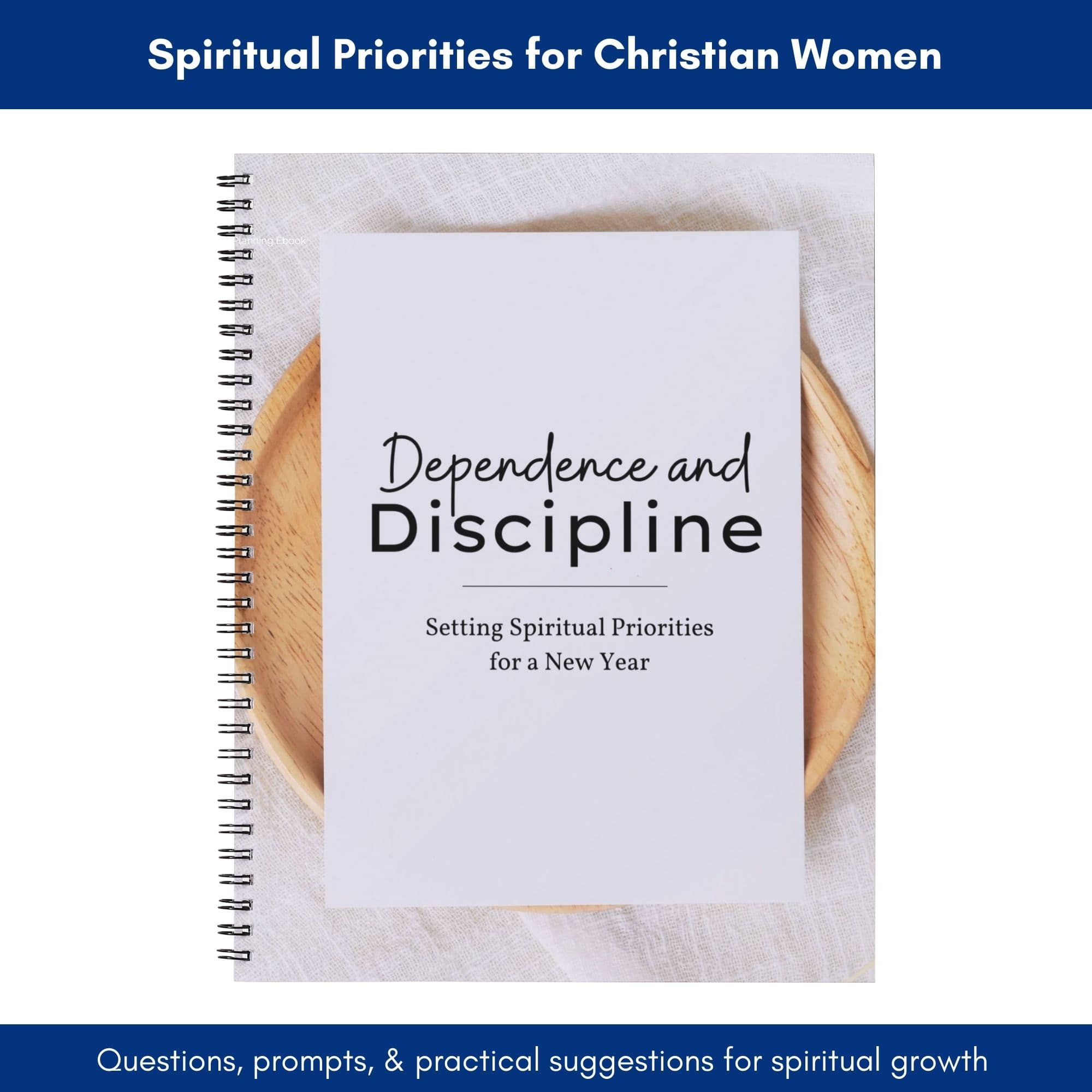
Dependence and Discipline in Loving God through Bible Reading and Prayer
We started out by thinking about the unique difficulties presented by our modern culture as we seek to discipline ourselves to set aside daily time for what we know is of most importance. While discipline is honed through practice, it must be paired with dependence for us to truly love God with all our hearts.
Discipline in reading your Bible and prayer is essential for those times you are struggling to feel God’s nearness or you’re distracted by the cares of this life. But dependence—the continual acknowledgment of the mighty power of God, His faithfulness and sovereignty, His grace and abounding love toward you—is what will deepen and strengthen your relationship with God as your good and gracious heavenly father.
This series will continue with another area we know God wants us to prioritize—loving others. We’ll dive deeper into specific, practical ways you can show love to others with prompts and questions to help you think through your priorities and suggestions for implementing them.
Read the next article in this series:
Practical Habits to Prioritize Loving Others
Visit my homeschool resources page for monthly unit study ideas, projects, and homeschool planning help!


